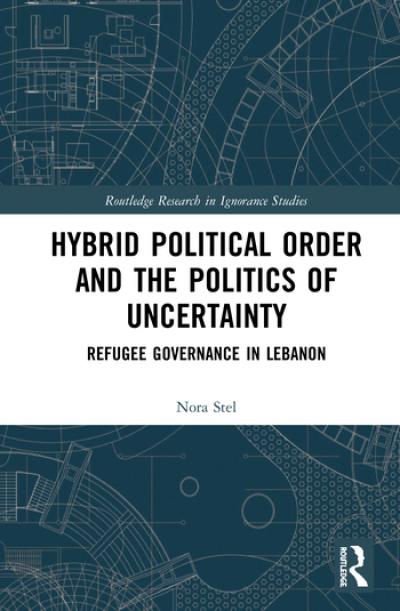Governing Refugees Through a Politics of Uncertainty: Insights from Lebanon
Posted:
Time to read:
Guest post by Nora Stel. Nora is Assistant Professor in Conflict Studies at Radboud University Nijmegen. She works on the epistemic politics of authority in conflict-affected settings, specifically the governance of forced displacement in the Middle East. Nora’s book Hybrid Political Order and the Politics of Uncertainty – Refugee Governance in Lebanon is now available with Routledge.

Lebanon hosts the highest number of refugees per capita worldwide, sheltering an estimated 1.5 million Syrians. It is, however, not party to the relevant international refugee conventions and has no national asylum law, insisting it is a transit and not a destination country. Lebanon suffers from a legacy of colonialism, civil war, and occupation. This has generated and propped up a sectarian political system that operates as a kleptocratic, oligopolistic mafiocracy that completely hollowed out any state capacity.
In light of this, it is unsurprising that Lebanon’s response to the Syrian refugee presence has been widely recognized as haphazard and fragmented. Yet despite the scale of this refugee crisis, such inconsistency and arbitrariness is not simply a result of limited capacity. In my new book, I demonstrate that it is also the outcome of strategically reproduced institutional ambiguity that reflects a lack of political will to create coherent and comprehensive rules of engagement to constructively deal with refugees.
Lebanon’s governance of Syrian refugees has developed from an initial ‘no-policy-policy’ to more complex forms of ‘formal informality’ since the issuing of the 2014 October Policy, evolving from outright inaction to intricate ambiguity. Underlying both phases, however, was – in the words of a senior government advisor – a ‘set of no’s:’ no refugees, no camps, no representation. A mass of ambiguously formulated, incompletely communicated, and arbitrarily applied decisions on entry and stay have imposed spatial, legal, and temporal informality on Syrians. They have been withheld refugee and residency status. Consequently, by 2017, 74% of Syrians in Lebanon lived there ‘illegally.’ With the government’s refusal to establish formal refugee camps, or let UNHCR do so, they have been abandoned to what has euphemistically called ‘self-settlement’ and a scattered collection of ‘informal tented settlements.’ In actively undermining NGOs’ attempts to support grassroots representative structures while simultaneously informally supporting repressive authority figures in refugee settlements, Lebanese state agencies have effectively undercut refugees’ voices and collective organization.
The above ‘policy’ has resulted in what Nizar Saghieh has called manufactured vulnerability. Stripped from legal protection, safe and affordable shelter, and political voice, refugees have been legally, politically, and socioeconomically marginalized. Their access to livelihoods and health and infrastructural services is barred, their mobility severely circumscribed, and they are routinely subjected to abuse and extortion by landlords, so-called sponsors, Lebanon’s shady array of security agencies, and local political strongmen.
This situation is not just the unfortunate outcome of a well-meaning but ‘fragile’ state. Granting refugees legal status, allowing international agencies to provide free shelter, and engaging with refugee representatives are not just a matter of resources. Instead, we need to come to terms with the fact that the misery of Syrian refugees in Lebanon aligns with much of the stated and unstated objectives of Lebanon’s ruling elite. Lebanon’s ‘response’ amounts to a politics of uncertainty that allows it to control, exploit and expel refugees.
Imposed informality and ambiguous rules and regulations undermine the agency of refugees and those seeking to help them, eroding their capacity to plan or organize collectively. It makes them entirely dependent on often exploitative sponsors, employers, and landlords – in a local ‘refugee economy’ that is politically and economically linked to national decision-makers through Lebanon’s tight sectarian hierarchies. And it serves to ‘encourage’ return to Syria to the extent that it amounts to de facto refoulement. The institutional ambiguity apparent in vague mandates, unspecified regulations, and explicit discretionary power through which this politics of uncertainty operates, moreover, allows authorities to deny responsibility and avoid accountability.
Acknowledging the complex but fundamental work that strategically generated and upheld institutional ambiguity in terms of status, shelter, and representation does in marginalizing refugees in Lebanon is essential to engage better with regional host countries. It also offers a crucial mirror to reflect on the European refugee regime. Emerging work on Europe’s infamous Mediterranean hotspot system, for instance, suggests that these ‘chokepoints’ are places of institutionalized non-recording and legal vacuum that are defined by incoherence and discretion. The strategic (re-)production of uncertainty as a disciplinary instrument appears to be a universal but often disregarded feature of the governance of displaced people.
Any comments about this post? Get in touch with us! Send us an email, or post a comment here or on Facebook. You can also tweet us.
__________
How to cite this blog post (Harvard style)
Stel, N. (2020). Governing Refugees Through a Politics of Uncertainty: Insights from Lebanon. Available at: https://www.law.ox.ac.uk/research-subject-groups/centre-criminology/centreborder-criminologies/blog/2020/09/governing [date]
Share:








